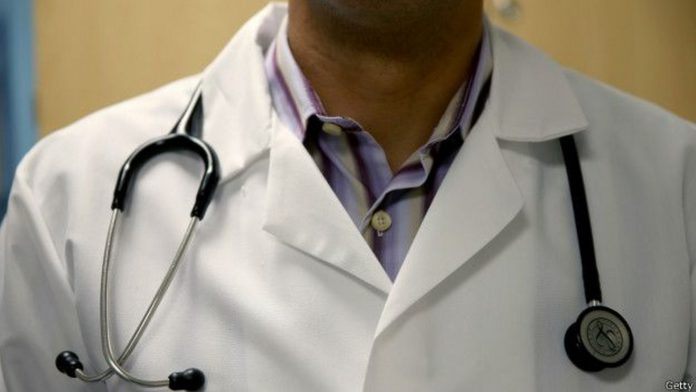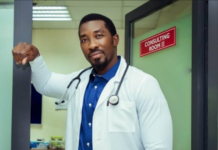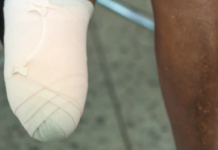
My day had started early that Friday. My wife, Joanne, and I arrived at 7 a.m. for my 10-year follow up colonoscopy with Dr. Smith. Although I had referred a number of my patients to his group, I hadn’t worked much with him or even met him. As the nurse was going through her checklist of tasks, she casually mentioned that he was retiring that day and a party was scheduled that evening.
I was taken into the procedure room on time and 30 minutes later I woke up in the recovery room.
“Dr. Mieczkowski, everything went well,” Dr. Smith told me. “I removed one large polyp and a few smaller ones, but none of them concern me. My office will let you know the results in a few days.”
I thanked him and offered best wishes on his retirement, thinking that I would never see him again. I was relieved ― no signs of cancer.
Joanne and I went home to eat lunch. Since I felt well, we drove to the office to do some paperwork. Around 2:45 p.m., I had an urgent need to use the bathroom and passed streaks of blood. I knew this was common after a colonoscopy, so I didn’t tell Joanne or call the doctor’s office. Fifteen minutes later, I felt more urgency and made another hurried trip to the bathroom. There was more blood ― a lot more blood.
“Oh shit! Damn it,” I said out loud.
I told Joanne what was going on, and she asked, “Do you want me to call the EMTs? Are you feeling faint?” We decided to drive ourselves to a hospital only a few miles away. I called the physician’s office with an update while we were on our way.
Upon arrival, I was relieved to see that the waiting room was empty. I checked in at the desk and a few minutes later, a nurse opened the door. “Dr. Mieczkowski? Come on back,” she told me.
I made it. I’m going to be all right, I thought. I took a deep breath of relief as Joanne and I walked through the door and were led to my room. The nurse did the usual check-in tasks, connected me to the monitor tracking my heart rate and blood pressure, put an IV in my arm, and drew blood for testing.
“No running fluids?” I questioned. “That’ll be up to the doctor after he sees you,” she replied. As she finished, I felt an urgent need to move my bowels and requested a bedside commode. I quickly passed several pints of blood, which nearly filled the container. I had just lost nearly 20% of my blood volume. I was stunned and knew that I was in trouble.
“So, you’re Dr. Mieczkowski,” Dr. Woods, the ER doctor, said sarcastically as he walked in. Great! Here we go, I thought. “Yup, that’s me,” I replied, trying to reduce the tension. I pointed out the blood in the commode, but Dr. Woods didn’t seem impressed.
While taking my medical history and doing a brief exam, he was constantly looking up at the monitor, which showed a heart rate of 62 and a normal blood pressure. (Typically, a person’s heart rate goes up to compensate for blood loss.) He commented on the low heart rate as an indication that I was stable. I was puzzled. “Dr. Woods, I’m on a high dose of a beta blocker for my blood pressure,” I told him. “My heart rate is always around 50 and never gets above 80.” It didn’t alter his thinking. I asked whether he was going to start running IV fluids and order blood transfusions. “You look pretty stable,” he answered. “I think we can hold off for now until the labs come back. We’ll see how it goes.”
I was dumbfounded. I had 40 years of experience. If I saw that amount of blood loss in a 62-year-old male with heart disease on aspirin ― a potent blood thinner ― I would have called for an immediate GI (gastrointestinal) consult, started IV fluids, and ordered blood to be ready for transfusion. Unfortunately, he jumped to a conclusion that my bleeding couldn’t be serious since my heart rate was low. He was running the show and damned if he was going to listen to me.
I continued to pass a large amount of blood every 20-30 minutes. Since the blood-filled commode had not been emptied, I used the bathroom across the hall. I was not thinking clearly at this point and failed to note the blood loss was not being measured. I always ordered nurses to monitor a patient’s blood loss and urine output. I became weaker and paler with each episode, and I began to worry that I was going to bleed out. I held back on sharing my fears with Joanne.

My condition deteriorated as the hours passed in the ER. The lab results documented the drop in my blood volume. My anxiety level grew ― another sign of worsening shock. I buzzed the nurse’s station and asked to have Dr. Woods come back. When he arrived, I went through my list of concerns. I asked again about getting blood and platelet transfusions.
“Where’s the GI consult for a repeat colonoscopy?” I asked. Dr. Woods had had enough of my questions. He interrupted me and said, “You know, Dr. Mieczkowski, you may have more grey hair in your beard than me, but this isn’t my first rodeo.” My wife and I looked at each other stunned! He went on, “I think you’re overreacting, and I’m sure you’re anxious. Why don’t I give you some lorazepam to calm you down.” I was in the hands of a doctor I didn’t know or trust, and he refused to listen to my concerns.
It was around 5:30 p.m. at this point. Then, to my surprise, Dr. Smith entered my room. He asked a few questions, peeked into the bedside commode, listened to my heart and abdomen and poked around a bit. I reiterated my worries and asked directly, “Are you going to do a repeat colonoscopy now?” He paused for a long while before finally answering, “Why don’t we wait this out and do a repeat colonoscopy tomorrow morning if you’re still bleeding. I’ll admit you to the hospitalist service.”
I knew from my own experiences that physicians always have to weigh the pros and cons of doing another procedure versus close observation. He had to know that a GI bleed is more serious in an older patient with heart disease on a blood thinner. What was I supposed to do now? We obviously disagreed about the next steps, but I couldn’t plead my case any further. He was delaying a potentially lifesaving procedure ― one of the major causes of serious adverse events. I couldn’t help but think that the evening retirement party influenced his decision.
Around 7 p.m., one of the hospitalists on duty visited me. He was thorough and, unlike Dr. Woods, he was respectful of my experience. He gave orders for blood and platelet transfusions, started IV fluids and admitted me to a medical unit upstairs. Since he was ending his shift, he assured me the night shift hospitalist would check in on me. Joanne and I were anxious to get out of the emergency room and off the hands of Dr. Woods. I was relieved.
Unfortunately, my bleeding continued in my new room. I noted that my nurse placed a basin in the toilet to measure my blood loss. When she saw the volume, she was startled and asked if I had been experiencing that level of blood loss all day. “Yes, and they never measured the blood loss,” Joanne told her.
The hours passed, and I lost track of time. I kept asking, “Where’s the blood?” The nurse kept replying, “It’s been ordered. We’re still waiting.” I was getting colder and less aware of my surroundings. I drifted in and out of sleep but felt my wife’s hand on me constantly. I knew she was scared. I was bleeding out, albeit more slowly than a person with a gunshot wound in their abdomen.
It was around 11:30 p.m. when a sense of calm started to come over me ― it was an acceptance that I might die peacefully in bed. So this is what it feels like to die, I thought. I was no longer afraid. “I’m going to die,” I said in a whisper. I can’t imagine how Joanne felt. My nurse got startled briefly, but she was experienced with critically ill patients and called in her team.
Within seconds more nurses arrived, and they took control since the hospitalist was nowhere to be found. Two additional IV catheters were placed for rapid infusion of fluids and blood in order to keep me alive. My nurse phoned Dr. James, the on-call GI specialist and one of my friends. She gave him an update and then handed me the phone. “Larry, we need to do the colonoscopy now,” he told me. “I’ll be there within the hour.”

The blood and platelets were delivered soon after, and within minutes it seemed the internal bleeding was slowing since the cramping and urgency had lessened. At 1:30 a.m., the nurses wheeled me down to the endoscopy suite. Dr. James arrived, and I was asleep within seconds of getting the anesthetic. He used four titanium clips to clamp an artery bleeding from the site of where the large polyp had been removed. Lab testing confirmed that I had lost nearly 50% of my blood volume.
I was discharged later that Saturday morning. Unfortunately, the shock and blood loss had damaged my heart, kidneys, and affected my thinking and memory. My condition worsened and after undergoing tests locally and at the Mayo Clinic, I was diagnosed with congestive heart failure, stage III kidney failure and chronic anemia. Despite adjustment in medicines, I still couldn’t handle the rigorous requirements of practicing medicine and my daily life, and I was advised by my PCP to stop working and pursue disability.
It was very difficult to accept this recommendation, and I was very angry. I loved my work. I had just moved into a newly remodeled office and, because I was so ill, I didn’t have six months to negotiate the sale of my practice ― I had to close my business. I tried to get a malpractice lawyer to represent me but after six rejections I was finished. Fortunately, I had good disability insurance.
Why do physicians miss a diagnosis or screw up on treatment plans? What’s more, why do too many of them not listen to their patients ― the most basic thing that should be a fundamental part of their practice?
Dr. Woods didn’t really want to consider my concerns, but he and Dr. Smith also failed to put all the pieces of the puzzle together, whether it was because of ego, putting too much importance on my low heart rate, or being distracted by a retirement party. They both had plenty of time for my evaluation and should have thoughtfully weighed my worries.
Unfortunately, my experience is common since adverse events occur in a reported 25% of hospital admissions. If you find yourself in one of these adverse events like I did, here is some advice that may be useful:
1. Resist yelling at the nurse or physician. It doesn’t help, and you may get labeled as “a difficult patient,” which could make matters worse.
2. If you are not being heard, get the unit’s charge nurse or manager involved early in the conflict since any delay may be a life-or-death issue. Because patients are randomly assigned to a hospital-based physician, these nurses can arrange a transfer to another physician’s care or get other specialists involved.
3. If you’re very ill and at a small community hospital, you should consider pushing for a transfer to a larger hospital and, if necessary, contact the hospital’s quality, risk management, or medical director’s office. This almost always guarantees action since no hospital wants to be sued.
4. Outpatient medical practice is very different from hospital-based care. The former is now volume driven and also rife with missed diagnoses, delays in treatment and unsatisfactory office visits. Nurse practitioners (NP) and physician assistants (PA) have similar outcomes as physicians, often have more time to spend with their patients and have high satisfaction ratings. However, ask to schedule a visit with the physician if you’re dissatisfied with the care of the NP or PA.
5. Improving communication with your provider may be aided by bringing another person with you to your appointment and having them serve as an advocate.

6. Since computers are now standard in most exam rooms, a provider may only spend 8-10 minutes face to face with you during a 20-minute appointment. Prepare for your visit by reading about your problem. For example, the Cleveland Clinic’s website has a great graphic depicting which organs may be causing abdominal pain. Type a list of your concerns but keep it focused, as, unfortunately, most physicians don’t have time to thoroughly address a long list of issues. Review your list with the medical assistant and ask them to scan it into your records.
7. Primary care providers may not consider a diagnosis they don’t often see. Requesting an ultrasound if the pain is severe or not improving may save your life. If the provider says that you don’t need it, you can get a self-funded ultrasound for less than $200 in many states. Take your concerns to the office manager or a director overseeing the practice.
8. Unfortunately, I don’t see a return to the times when doctors spent 30 minutes with a patient. Paying PCPs more for their time would quickly change the system, but it’s not going to happen. Medicine has morphed into big business with trillions of dollars spent each year. Finding a great provider may be a challenge but there are well-trained doctors, NPs and PAs out there who will listen to you. Word of mouth referrals are often the best. Reviews of physicians on hospital websites are not helpful in my experience, so check out independent sites when possible.
9. View your first couple of visits with a new practice as an interview and move on if it’s not a fit. Remember, you can always end a long-standing relationship with a practice. If you decide to divorce your provider, send a certified letter to the administrator of the practice explaining why you are leaving.
We physicians know the healthcare system is broken. Hospital executives are overpaid. Since PCPs are paid on average $180,000 versus the $500,000 an orthopedic surgeon makes, the best and brightest medical students often pursue highly paid specialty positions. Physicians are overbooked, overwhelmed, tired and burned out. Computerized medical records have made it worse. The end result is often poor patient outcomes. Since you can’t change the system, you have to learn how to navigate through its waves using some of the suggestions that I have made.
After my experience, I was certain that I wouldn’t survive a year but it’s now been over five years. My kidney function and anemia have improved. I am still dealing daily with my heart failure, restricting salt, resting for hours at a time and reducing my activities. I was able to resume golfing. Through my physicians’ support and the love and tender care of my wife and others, I have accepted what happened to me. It’s not what I had envisioned a decade ago, but I have a good quality of life. In the end, I survived, but I came too close to death that should have been easily prevented.







